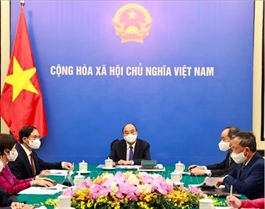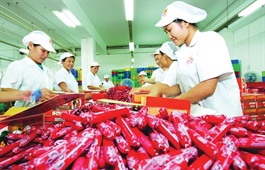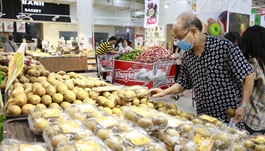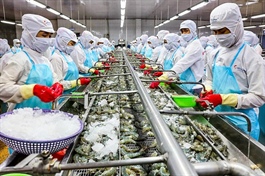Enhancing the competitiveness of special Vietnamese brands
Enhancing the competitiveness of special Vietnamese brands
While global trade plays an increasingly important role in Vietnam’s socioeconomic development, the government’s Vietnam Value Programme has been contributing to establish and promote domestic brands within local and international markets. Van Nguyen spoke to Vu Ba Phu, director general of the Vietnam Trade Promotion Agency under the Ministry of Industry and Trade, about the programme’s development and influence in enhancing the position of Vietnamese products and services.
How have the perceptions of Vietnamese enterprises on the role of brands changed since doi moi?

Van Nguyen spoke to Vu Ba Phu, director general of the Vietnam Trade Promotion Agency under the Ministry of Industry and Trade
|
Before 1986, the Vietnamese economy was one with two forms of ownership and the two main types of economic entities were state-owned enterprises and collectives, with only a few individual entities present in the economy but no private and foreign-invested companies.
Thus, the state’s economy accounted for a large proportion, with tens of thousands of state-owned enterprises all managed by the state. The collectives made up most of the non-state sector with thousands of cooperatives in all sectors, with their input materials mainly supplying products purchased by the state. Therefore, in this period, the concept of brand names almost did not exist as there was also no competition in the market.
Between 1986-1995 was the first stage of the renovation process, aiming to develop a multi-component commodity economy, operating under the socialist-oriented market mechanism. Nevertheless, at this time, the role of brands was also neglected as businesses mainly focused on the domestic market.
Since 1995, however, the awareness of the Vietnamese business community has made remarkable changes. Especially, the prime minister approved the Vietnam Value Programme with Decision No.253/2003/QD-TTg in 2003 as the only programme of the government to assign the Ministry of Industry and Trade (MoIT) to be the regular body responsible for the implementation of the programme. This is an unique and long-term trade promotion program which aims to build Vietnam’s image as a country home to high-quality products and services, as well as to increase the pride and attraction of the Vietnamese country and people, and to boost foreign trade and national competitiveness.
In addition, the fact that Vietnam officially became the 150th member of the World Trade Organization also marked an important milestone, contributing to the country’s economic integration into the region and the world. These opportunities for goods and services export, as well as deep integration with the global economy through bilateral and multilateral trade agreements, also creates more competitive pressure in the domestic market.
Which results have proven the success of the programme?
One of the most concrete examples is that, while in the early 2000s, the Vietnamese brands did not appear in the rankings of international organisations, by 2020 the total brand value of the Forbes 50 Vietnam reached more than $12.6 billion, especially many enterprises with products honoured Vietnam Value such as Viettel, Vietnam Airlines, Vinamilk, MobiFone, and Vietcombank, among many others.
According to the Brand Finance report, in 2020 Vietnam was one of the countries with the fastest growth in national brand value in the world, up to $319 billion, increasing 29 per cent compared to 2019. As a result, Vietnam’s national brand value has increased nine ranks, reaching 33rd in the Top 100 most valuable national brands in the world.
While participating in the Vietnam Value Programme, many Vietnamese corporations have become aware of the important role of brands as the key to increasing product and corporate value. Enterprises have gradually built, developed, and managed their brands, and the number of them who have products recognised as national brands has steadily increased over the last 13 years. By 2020, the Vietnam Value Programme honoured 124 enterprises with 283 products, including many that have resonated within the regional and international markets.
Compared to many other programmes and activities to honour Vietnamese businesses, what are the differences to the Vietnam Value Programme?
The long-term and unique trade promotion programme of the government has a different approach and brings value to enterprises. The programme was approved by the prime minister and carried out by the MoIT and related ministries and sectors, so the level of prestige is very high, and the products even reach recognition in the National Assembly of Vietnam. Participating companies must go through a strict and transparent selection process according to the administrative procedures specified in the prime minister’s Decision No.30/2019/QD-TTg from 2019 and the criteria system of the MoIT.
The programme is not only an award but also a selection of products which make enterprises become partners of the programme. The state does not act for businesses but will stand out to sponsor quality and reputable brands, so that Vietnamese enterprises can create a strong foothold in the domestic market and promote brand development on the global stage.
How can Vietnamese enterprises and the government inherit the achievements from the previous period to continue to develop and elevate brands?
Firstly, Vietnam is famous for a long-lasting history, unique culture, and a multi-ethnic country. Vietnam also imprints in the eyes of international friends as a country with peace-loving people, and an indomitable spirit to gain glorious victories. Those are extremely meaningful inheritance values that not all nations have.
Fuelled by remarkable achievements in the innovation process and in the socioeconomic development, Vietnam has become a destination of choice for foreign investors and trading partners throughout the world. The country’s image and reputation have been increasingly enhanced in the international arena, and so have its national brands.
Today, development of national brands not only includes products and services but also covers broader connotations associated with the national image and hard power factors like infrastructure, strategic location, asset concepts, economic stability, productivity, attraction policy, and cost-effectiveness, as well as soft power factors such as quality of life, workforce expertise, human relations, entrepreneurship, and professionalism in market and business communication.
Besides that, many countries around the world need to build their brands and position themselves differently from other countries on a global scale. Therefore, Vietnam can take its advantage off its image of rich national identity and peace-loving core as our nation’s distinctiveness.
Moreover, production is increasingly focusing on the foundation of advanced science and technology, so more of the global added value can be exploited and make it will be easier to access global markets than ever before. This means that all countries need to develop national brands by attracting knowledge and skilled human resources to live, work, and settle in the country.
As a result, the MoIT-management agency of the Vietnam Value Programme, has been marketing and promoting the programme and encouraging those enterprises to participate who share and pursue the core values of the programme, which are quality, innovation, and leadership.
With these companies, it will be possible to continue building the image of Vietnam as a reputable country with high-quality goods and services as well as increasing the pride and attractiveness of the country and its people, while contributing to promote the development of foreign trade and enhance the competitiveness of Vietnamese brands in the international arena.


























